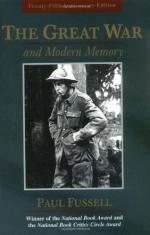
|
| Name: _________________________ | Period: ___________________ |
This test consists of 5 multiple choice questions, 5 short answer questions, and 10 short essay questions.
Multiple Choice Questions
1. According to the British commander, what was obvious to him throughout the first part of the war?
(a) They needed more army members.
(b) They needed men to enlist.
(c) They needed a stronger army.
(d) They needed a better attack plan.
2. The last of the volumes of Siegfried Sassoon's works is called _____.
(a) Siegfried's Life.
(b) Siegfried's Travel.
(c) Siegfried's Journey.
(d) Siegfried's Journey Through Life.
3. What was the difference between British commanders Haig and Plumer?
(a) Training.
(b) Strategic planning.
(c) Imagination.
(d) Experience.
4. Over a period of time, the soldiers became polarized in their _____.
(a) Communication.
(b) Spending money.
(c) Way of life.
(d) Thinking.
5. How long in 1916 did the British commander prepare his troops for the battle against the Germans?
(a) First six months.
(b) Last six months.
(c) First six months.
(d) Last five months.
Short Answer Questions
1. The farmers who continued to work their fields behind the lines were surrounded by what?
2. What country's submarines were active in the Atlantic and ultimately brought America into World War I?
3. In "How Young They Died," a soldier, after two weeks in France, feels how?
4. What were these trenches called?
5. What author does Fussell mention in representing the idea of crucifixion?
Short Essay Questions
1. What three things happened in November 1918 when the Allies broke through the German lines with their counterattack?
2. What was the British Line?
3. What was the difference between British commanders General Sir George Plumer and Sir Douglas Haig?
4. How does George Sherston use the sky within his writings?
5. What types of rumors and myths surrounded the number three?
6. How did various authors bring in the topic of the sunrise and sunset in reference to the war?
7. How is the literature presented to illustrate the dichotomy between the officers and the soldiers?
8. What was the paradox for many soldiers fighting in World War II?
9. Explain the story of the Crucified Canadian?
10. What has happened to the area by the Somme River where a fierce battle in the war took place?
|
This section contains 718 words (approx. 3 pages at 300 words per page) |

|




